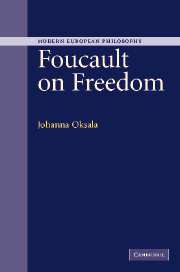7 - The silence of ethics
Published online by Cambridge University Press: 26 October 2009
Summary
My whole tendency and I believe the tendency of all men who ever tried to write or talk on Ethics or Religion was to run against the boundaries of language. This running against the walls of our cage is perfectly, absolutely hopeless. Ethics so far as it springs from the desire to say something about the meaning of life, the absolute good, the absolute valuable, can have no science. What it says does not add to our knowledge in any sense. But it is a document of a tendency in the human mind which I personally cannot help respecting deeply and would not for my life ridicule it.
(Wittgenstein 1965, 11–12)Foucault never developed a theory of ethics, yet his two last books, The History of Sexuality, volumes ii and iii, could be characterized as being concerned primarily with ethics. They deal with the sexual morality of ancient Greece and the Roman Empire. The question that guides Foucault's inquiry is: ‘How, why and in what form was sexuality constituted as a moral domain?’ (UP, 10). The focus of the inquiry is thus on the manner in which sexual activity was problematized, mainly by philosophers and doctors in texts written as guides for others. In the second volume of The History of Sexuality, The Use of Pleasures, the period under study is the classical Greek culture of the fourth century bc.
- Type
- Chapter
- Information
- Foucault on Freedom , pp. 157 - 174Publisher: Cambridge University PressPrint publication year: 2005



